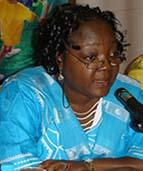Why structural transformation of Africa matters in Post-2015 era – By Aida Opoku-Mensah

 In September 2000, the UN Millennium Summit endorsed the Millennium Development Goals (MDGs) in the Millennium Declaration, which was signed by more than 180 countries. The main objective of the summit was to set quantifiable and time-bound goals to end human suffering from hunger, destitution and diseases. With less than three years remaining until the 2015 deadline for reaching the Millennium Development Goals, Africa’s progress toward the various targets of the MDGs continues to be uneven. Remarkable advances have been made in some indicators such as net primary enrolment, gender parity in primary education, representation of women in decision making, immunization coverage and stemming the spread of HIV/AIDS. However, the limited involvement of developing countries, in general, and Africa in particular, in the formulation of the MDGs has contributed to weak ownership and slow progress.
In September 2000, the UN Millennium Summit endorsed the Millennium Development Goals (MDGs) in the Millennium Declaration, which was signed by more than 180 countries. The main objective of the summit was to set quantifiable and time-bound goals to end human suffering from hunger, destitution and diseases. With less than three years remaining until the 2015 deadline for reaching the Millennium Development Goals, Africa’s progress toward the various targets of the MDGs continues to be uneven. Remarkable advances have been made in some indicators such as net primary enrolment, gender parity in primary education, representation of women in decision making, immunization coverage and stemming the spread of HIV/AIDS. However, the limited involvement of developing countries, in general, and Africa in particular, in the formulation of the MDGs has contributed to weak ownership and slow progress.
In addition, to the extent that the MDGs were not aligned with both continental and national programmes in Africa this has created an additional burden for countries both in terms of data production and monitoring. This was reflected in the African Common Position on the Post-2015 agenda. This time around Africa has a unique opportunity to own its development agenda, and a chance to stamp its priorities into the Post-2015 compact.
Changing the narrative on Africa’s development
The Post-2015 development agenda is coming into existence at a time when Africa is on the ascendancy. Real income per person has increased by more than 30%, whereas in the previous 20 years it shrank by nearly 10%. Africa is the world’s fastest-growing continent just now”. This all goes to present a new Africa one with a stronger, more positive image than ever before.
Despite the narratives on the positive outlook for the continent, there are those who feel a lot more still needs to be done to get Africans owning the development discourse. This is mainly due to the fact that Eurocentric paradigms have been used to define Africa’s development to date! This aspect has contributed negatively to the continent’s image in the past. For decades the narratives on Africa’s image, and consequently its development trajectory was in the hands of the western media, who concentrated on the bad news coming out of the continent – to the extent that they almost missed the continent’s ascendancy!
Today, the advent of social media is creating stronger African voices and champions who own the discourse on Africa’s development. With the rise in use of social media in Africa the western media no longer dominate the story on Africa. Twitter, Facebook and other forms of social media are giving voice to Africans with consistently vigorous, lively and varied narratives on the future of African development.
Social media also serve to challenge mainstream narratives on African development. Furthermore, it demonstrates that traditional media outlets no longer have control over the conversations around their coverage as they did before. Social media and other online platforms are providing people with the ability to speak out and take part in agenda-setting. This phenomenon in itself is changing and driving the development discourse on Africa.
Advancing a structural transformation agenda
African leaders recognized structural transformation as a key to the continent’s development, with Heads of State urging “a paradigm shift from managing poverty to economic transformation for Africa” at the 14th African Union Summit in 2010. So moving away from structural adjustment to structural transformation is an imperative. Some enablers can make this happen.
Africa will become the “new demographic powerhouse of the world”. 70% of the African population is below the age of 30 years, which offers a demographic opportunity because Africa’s adult population (its future workforce) is rising rapidly: it was 460 million in 2010 and is expected to be almost 800 million by 2030. A similar demographic transition explains roughly a third of East Asia’s growth performance over the last three decades. Consequently education will become a crucial enabler for providing the requisite workforce of the future – key to sustaining any structural transformation.
Africa’s continued dependence on primary commodities and the need to create decent jobs and strengthen resilience to external shocks would require, among other things, an industrialization and value-addition agenda, emphasising private sector development and transformation of the informal sector. More specifically, structural transformation will require a particular focus on target-setting for structural transformation by increasing manufacturing’s share of GDP, as a key vehicle for job creation.
Yet, Africa remains marginal in the global manufacturing trade. Its share of global MVA has actually fallen from an already paltry 1.2% in 2000 to 1.1% in 2008. In terms of exports, Africa’s share of global manufacturing exports rose from 1% in 2000 to only 1.3% in 2008. Africa is also losing ground in labour-intensive manufacturing: Its share of low-technology manufacturing activities in MVA fell from 23% in 2000 to 20% in 2008, and the share of low-technology manufacturing exports in Africa’s total manufacturing exports dropped from 25% in 2000 to 18% in 2008. The African continent needs to create 10 million new jobs each year. Industrialisation must be taken seriously if countries are to meet such a target. The creation of jobs would require an increase in the African industrial output by approximately 20%, if jobs are to be created. Manufacturing has to be at the heart of a structurally transformed Africa.
Facing the future
A global development compact, which is the Post-2015 framework, is coming into existence at an exciting time in Africa’s economic history with a growing middle class, which is shifting perceptions about Africa’s prospects. This framework can only serve to compliment what countries put in place and not vice versa. Therefore the future is bright insofar as countries can capture the African Moment in a transformative way. It is only then that the Post-2015 development agenda would serve a meaningful purpose for the continent.
Aida Opoku-Mensah is Special Advisor on the Post-2015 Development Agenda, UN Economic Commission for Africa.






